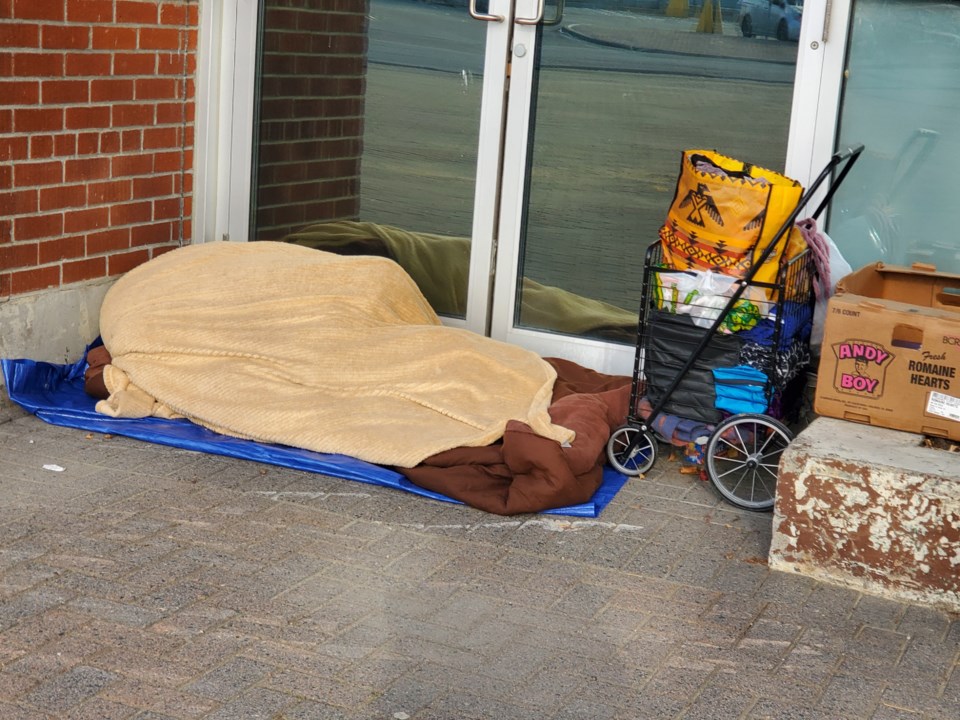The city strengthened their arsenal in their fight against homelessness Thursday night as the finance and administration committee approved adding a business case to implement transitional housing to the 2021 budget.
Brought forward by a trio of councillors, Ward 9's Deb McIntosh, Ward 10's Fern Cormier and Joscelyne Landry-Altmann of Ward 12, the $2.2 million initiative will come with no impact to the net levy in 2021.
"The business case responds to a request to review gaps in the community and provide a targeted transitional housing business case that responds to chronic homelessness in the community and also addresses the high level of opioid addiction," said Tyler Campbell, director of social services.
"This introduces the concept of using an intensive clinical assertive community treatment team in a residential setting to work with clients."
Much of the business case was informed through a pair of community consultations on homelessness that was held earlier this year.
Funds to implement the transitional housing project will be drawn from a number of sources in order to create a net zero impact on the tax levy.
- There will be a one-time draw from the Healthy Community Initiaves (HIC) fund in the amount of $100,000
- A one-time contribution from reserves will be made in the amount of $295,309
- A one-time contribution from the Social Services Relief funding will be made in the amount of $478,739
- The approved $144,200 reduction to the Greater Sudbury Public Library Board will be redirected
The intial plan was to draw $200,000 from the Greater Sudbury Development Corporation beginning in 2022, but that didn't sit well with Mayor Brian Bigger and those funds were redirected and will be recouped through a reduction in the city's contributions to capital.
In total the city will see an ongoing reduction of $800,000 to capital, which didn't exactly sit well with Ward 4 Coun. Geoff McCausland, who has been outspoken on a number of occasions about the city's underfunded capital reserves.
The city will also receive $100,000 annually through rental revenues as a means to recover costs associated with the project.
Mayor Brian Bigger spoke highly of the project, commending the work of the councillors and staff who helped make it a reality. While the up front costs have been covered in principle, Bigger said that there will be a need to seek outside funding sources in order to maintain and operate a transitional housing facility.
"I appreciate the work that councillors McIntosh, Landry-Altmann and Cormier have put into this, ideas have to come from somewhere and there's a lot of legwork in getting a project like this off the ground," said Bigger.
"If this is passed, it truly is a team of 13 and all of council that would move it forward. It reminds me of the idea of an off the street shelter at 200 Larch and the decision of an entire council to donate a building."
The support of council back when the off the street shelter opened up doors for provincial funding. A request for $3 million for the Off the Street shelter turned into nearly $8 million in funds to provide an overnight shelter and harm reduction site that serves around 30 people.
"We've done these things before, we have stepped up as a council, it's absolutely noticed and recognized at the provincial level," said Bigger.
"I can tell you that there are a few expenses in here I'm concerned about; I would hope that we could find an alternative source of funding. You'll have my commitment to strongly advocate to various ministries at the provincial level to find sources of operational funding."
Ward 1 Coun. Mark Signoretti also raised some concerns about funding sources, noting that while 2021 was covered, moving forward into 2022 and beyond would present council with some funding questions.
"With the Health Community Initiative I'm fine with a one-time ask for 2021, my concern is the ongoing request for HCI funds to be allocated to this request," said Signoretti.
"We have to be cognizant of HCI; there's initiatives in every ward that moneys are leveraged to realize other money to have new playgrounds, splash pads, or other things for kids or citizens in our community."
The committee agreed to amend the motion to have the HCI funds only be drawn upon for 2021 in the amount of $100,000
City CAO Ed Archer gave an overview of the city's financial outlook with respect to the transitional housing project, explaining that the motion was well put together and provided a sound plan for this year and 2022.
"These would be considerations that would work their way into the plans (for budget 2022) and if circumstances change between now and the time the 2022 budget is finalized, some of these funding sources could either be replaced with funding from provincial sources," said Archer.
"Absent those alternatives, this would be an approach to address funding requirements in 2022 that would keep the service sustainable."
